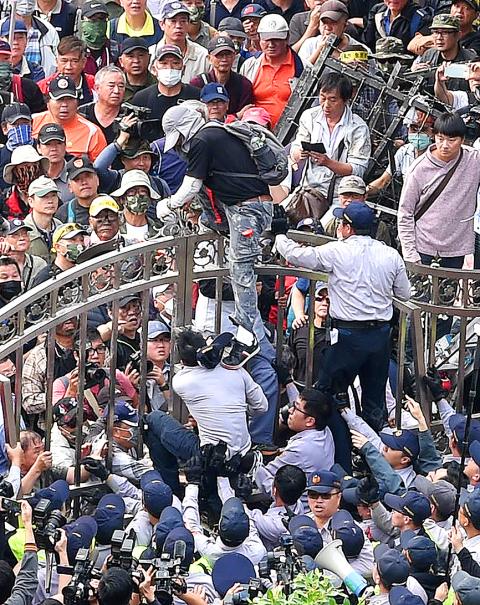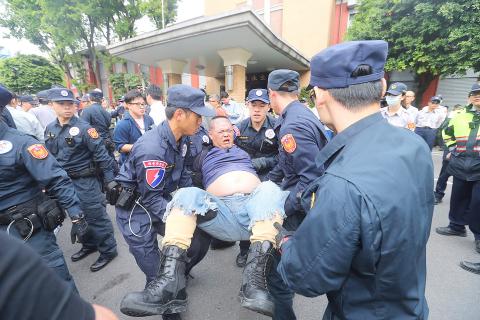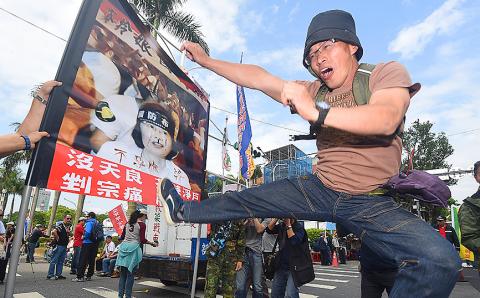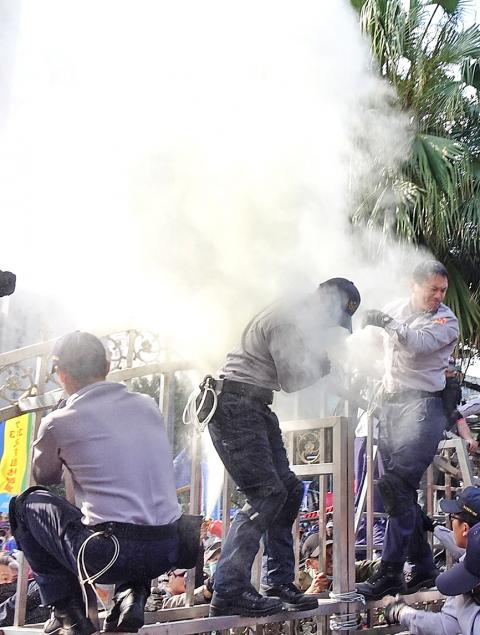As of press time last night, 32 police officers and 11 journalists had been injured, and 63 protesters arrested yesterday during a demonstration in Taipei against planned pension reform for veterans.
Retired military personnel at a public hearing at the Legislative Yuan in the morning called on the government to delay its plan to cut their pensions, as veteran groups staged a series of protests outside the legislature.
The Executive Yuan earlier this month unveiled draft amendments to the Act of Military Service for Officers and Noncommissioned Officers of the Armed Forces (陸海空軍軍官士官服役條例), which would set the minimum monthly pension at NT$38,990 and gradually phase out an 18 percent preferential interest rate on the savings of retirees who had enlisted before 1995.

Photo: Fang Ping-chao, Taipei Times
At the hearing yesterday morning, Luo Jui-ta (羅睿達), chief executive of the 800 Heroes veterans’ group, urged the government to delay reviewing the bill, because “it could be unconstitutional.”
The government should apply for a constitutional interpretation, because the bill might have violated the principle of legitimate expectation, he said.
“President Tsai Ing-wen (蔡英文) said no one would be ‘unable to live’ because of the reform, but how many of the nation’s veterans have become handicapped or sacrificed their marriage because of their service to the nation,” he said.

Photo: CNA
He also accused the government of using the pension fund’s impending bankruptcy as a reason for cutting military pensions.
“If the Ministry of National Defense allocates money toward the fund every year according to the law and properly manages the fund, the system would never go bankrupt,” he said.
“We just want justice and dignity for those who have fought for the nation,” Luo said, adding that the government should have communicated with them on the issue before drafting the bill.

Photo: Liao Chen-huei, Taipei Times
Previous reforms did not cause the same level of outrage, because they were not retroactive, Chinese Nationalist Party (KMT) Legislator Ma Wen-chun (馬文君) said.
To avoid disputes, “the government should apply the Labor Standards Act (勞基法) to civil servants, public-school teachers and military personnel, so that people of different occupations and generations are treated based on the same standards,” she said.
Democratic Progressive Party (DPP) Legislator Wang Ding-yu (王定宇) at 1pm announced the end of the hearing, despite protests from members of the 800 Heroes and KMT legislators, who had expected a second round of discussions.

Photo: Liu Hsin-de, Taipei Times
Members of the 800 Heroes criticized the DPP for being “arrogant and rude,” and vowed to never stop protesting until they receive a proper answer from the ruling party.
Outside the legislature, police had erected barbed wire and barricades around the Legislative Yuan and the Executive Yuan, and mobilized more than 1,200 officers to prevent protesters from breaking into the compounds.
At 3pm, protesters began clashing with police outside the Legislative Yuan compound, throwing wood planks, smoke grenades and PET bottles at them. Some attacked journalists and tried to take their cameras away.
At about 4pm, several protesters broke into the Legislative Yuan compound and were immediately arrested.

MAKING WAVES: China’s maritime militia could become a nontraditional threat in war, clogging up shipping lanes to prevent US or Japanese intervention, a report said About 1,900 Chinese ships flying flags of convenience and fishing vessels that participated in China’s military exercises around Taiwan last month and in January have been listed for monitoring, Coast Guard Administration (CGA) Deputy Director-General Hsieh Ching-chin (謝慶欽) said yesterday. Following amendments to the Commercial Port Act (商港法) and the Law of Ships (船舶法) last month, the CGA can designate possible berthing areas or deny ports of call for vessels suspected of loitering around areas where undersea cables can be accessed, Oceans Affairs Council Minister Kuan Bi-ling (管碧玲) said. The list of suspected ships, originally 300, had risen to about 1,900 as

Japan’s strategic alliance with the US would collapse if Tokyo were to turn away from a conflict in Taiwan, Japanese Prime Minister Sanae Takaichi said yesterday, but distanced herself from previous comments that suggested a possible military response in such an event. Takaichi expressed her latest views on a nationally broadcast TV program late on Monday, where an opposition party leader criticized her for igniting tensions with China with the earlier remarks. Ties between Japan and China have sunk to the worst level in years after Takaichi said in November that a hypothetical Chinese attack on Taiwan could bring about a Japanese

Right-wing political scientist Laura Fernandez on Sunday won Costa Rica’s presidential election by a landslide, after promising to crack down on rising violence linked to the cocaine trade. Fernandez’s nearest rival, economist Alvaro Ramos, conceded defeat as results showed the ruling party far exceeding the threshold of 40 percent needed to avoid a runoff. With 94 percent of polling stations counted, the political heir of outgoing Costa Rican President Rodrigo Chaves had captured 48.3 percent of the vote compared with Ramos’ 33.4 percent, the Supreme Electoral Tribunal said. As soon as the first results were announced, members of Fernandez’s Sovereign People’s Party

MORE RESPONSIBILITY: Draftees would be expected to fight alongside professional soldiers, likely requiring the transformation of some training brigades into combat units The armed forces are to start incorporating new conscripts into combined arms brigades this year to enhance combat readiness, the Executive Yuan’s latest policy report said. The new policy would affect Taiwanese men entering the military for their compulsory service, which was extended to one year under reforms by then-president Tsai Ing-wen (蔡英文) in 2022. The conscripts would be trained to operate machine guns, uncrewed aerial vehicles, anti-tank guided missile launchers and Stinger air defense systems, the report said, adding that the basic training would be lengthened to eight weeks. After basic training, conscripts would be sorted into infantry battalions that would take